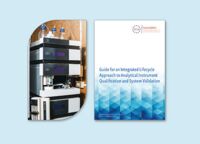Conference: Analytical Instrument Qualification and System Validation
26/27 November 2024
Background & Objectives
Analytical Instrument Qualification (AIQ) and software validation are processes to ensure that analytical instruments or equipment are suitable for their intended use and produce reliable and accurate results. AIQ is critical for ensuring the quality and integrity of analytical data generated by the instrument, which is essential for making informed decisions in research, development, and quality control processes. It helps minimize the risk of errors, ensure compliance with regulatory requirements, and maintain confidence in the accuracy and reliability of analytical results. Requirements and guidance for the pharmaceutical industry are laid down, among others, by the
- EU GMP Guide
- EU GMP Annex 15: Qualification and Validation
- EU GMP Annex 11: Computerised Systems
- US GMP 21 CFR 211
- USP <1058> Analytical Instrument Qualification
- GAMP 5 Guide
Currently, a USP Expert Committee is reviewing and revising USP <1058>, and the proposal is to change the title of the general chapter to Analytical Instrument Qualification and System Validation (AIQSV).
During this conference track, participants will get an overview of the regulatory requirements for the qualification of analytical equipment and the software validation of computerized systems. Additionally, practical advice on successful approaches to calibration, qualification, validation, and routine monitoring of instrumentation and systems will be provided. Key requirements of the USP General Chapter <1058> will be presented. Furthermore, selected aspects and comments received related to the new ECA Guide for an Integrated Lifecycle Approach to Analytical Instrument Qualification and System Validation will be highlighted and discussed.
The ECA Analytical Quality Control Group (AQCG) has developed a new Guide for an Integrated Lifecycle Approach to Analytical Instrument Qualification and System Validation. The ECA has decided to publish the Guide widely by allowing users to download the document free of charge. The PDF file is available in the AQCG members' area. Comments and recommendations related to version 1 of the document can be submitted until 30 June 2024, by using a form linked in the AQCG member area.
Article on AIQ and System Validation in our Media Partner's Publication

Explore the article Gerätequalifizierung und Systemvalidierung (German language) we published with our media partner GIT Labor-Fachzeitschrift (issue Oktober 2024). >> Find out more
Target Audience
This conference will be of significant value to laboratory managers, supervisors and analysts, quality control managers, heads of quality control, Qualified Persons (QPs), Analytical scientists, Senior laboratory staff and responsible authorities.